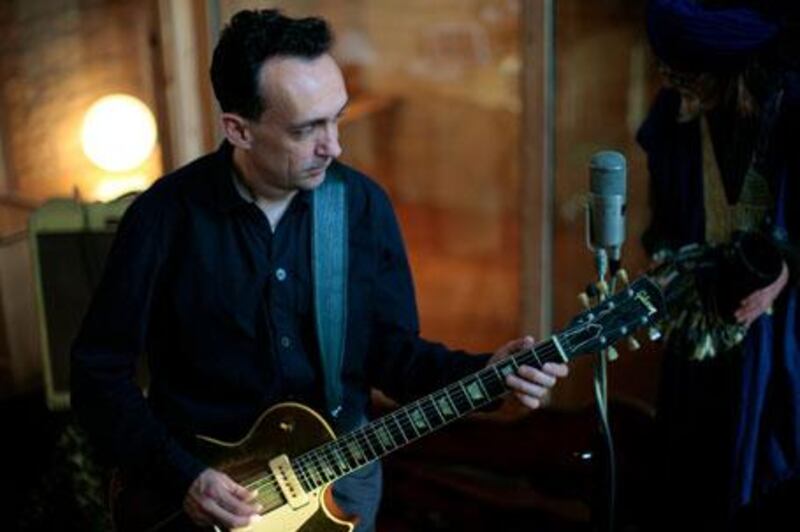Justin Adams is sometimes described as a "serial collaborator". His lifelong passion for West African, Arabian and rock music, often all mixed together and combined with his fascination with the sounds of the deserts of the world, made him an obvious choice to put together a very special concert. He hopes that Desert Cultures, one of the highlights of next month's Womad Abu Dhabi festival, will be rather more than just another show. It will be an event where musicians from the Sahara, Kalahari and Gobi deserts and from Rajasthan will mingle with the audience, talking to them about their work and selling artefacts and merchandise representing their cultures.
In the magical surroundings of the Al Jahili Fort in Al Ain, it has the makings of a memorable Womad evening. Currently, Adams is at home in the UK spa town of Bath, nursing a streaming cold and hacking cough that threatens several times to stop him speaking altogether. He has nearly a month to recover before the two performances on April 22 and 23, but in any case he is not scheduled to sing himself. This time he is the show's curator.
"Womad approached me with the idea of doing a stage around a theme which is something they normally don't do," he says. "Increasingly we have become aware of the fantastic music from the Sahara and because we're out there in the desert at Al Ain, Womad thought we should extend this theme a bit. They know that I've got twin interests very much in West African music but also in Arabic music." Explaining that he is very interested in how music has moved around the world, he adds: "One thing I find about deserts is that they are sometimes places where things have remained quite ancient and it gives you insights into how music was thousands of years ago.
"You could make other cases for the modernity of desert music, but as a repository of ancient music I looked towards the Kalahari Desert because I'd heard recordings of Bushman music from the Fan people that were written about by Laurens van der Post in his Lost World of the Kalahari. "That sounds to me like the most ancient music in the world, but I've never actually seen anyone performing it. So I got in touch with a friend who works for the School of Oriental and African Studies in London to see if I could find a group and sure enough we found a group called the !Gubi family. They are a nomadic people and fantastic travellers and communicators."
Adams's work as a guitarist and producer with groups and artists as diverse as Tinariwen, Robert Plant, Sinéad O'Connor, Juldeh Camara and Jah Wobble has given him a unique opportunity to explore many different musical cultures. His performance in Abu Dhabi in 2009 with the Gambian master "riti" player Camara and Plant was a highlight of the festival. Also appearing in Al Ain will be the Tuareg group Tinariwen from the Sahara, with whom Adams has often worked in the past. "They are a fantastic group and represent a form of modernity in the desert in that they use electric guitars but with a very strongly indigenous desert culture feel.
"You can hear the influence of rock music, although it could come from nowhere but the Sahara with its haunting beauty. Just the sight of these guys in their long robes playing electric guitars is fantastic." A gypsy group called Musafir from the deserts of Rajasthan is also in the mix with its earthy Indian music, which Adams describes as falling somewhere between Ravi Shankar and Bollywood. Womad is setting up a tented area alongside the Desert Cultures main stage where musicians will have the opportunity to hang out and jam together, sip a glass of mint tea and examine handcrafted jewellery and musical instruments from the deserts of the world.
"We're going to try and get the musicians off the stage to interact with the people. They will be around selling some of their artefacts and doing informal offstage performances. As much as possible, we're going to try and give people the experience of what it would be like to hear the music in its original state." Born into a diplomatic family and educated at Eton, the elite British boys' school, Adams comes from unlikely stock for a rock musician. His father was the British ambassador to Jordan and Adams grew up listening to the melodies of Arab singers such as Fairuz and Umm Kulthum, favourites of his parents.
"We lived in Jordan and later in Egypt, so the Middle East was very much part of my upbringing," he says. "It got me started. Arabic music has never sounded foreign to me. It was always a normal part of the landscape." In his teenage years he discovered rock 'n' roll and the guitar, he says adding that his elder brother had "fulfilled all the family expectations by going into the diplomatic service and doing well, so as the younger son I was able to do what I liked".
He was in punk and rock bands throughout college and travelled in Turkey and other parts of the Middle East listening to music before linking up with the guitarist Jah Wobble, with whom he toured and made several albums. He has also recorded and toured with O'Connor and Natacha Atlas and wrote the soundtrack for the film Kin as well as contributing tracks to the Bosnian film Beautiful People. Along the way he has produced groups such as Tinariwen and the French band Lo'Jo. His acclaimed first solo album, Desert Road, released in 2000, is a bluesy combination of African, Arabic and rock rhythms.
The call from Robert Plant, asking Adams to work with him, came out of the blue. "I was completely star-struck at first. That was a pretty surprising phone call to get. He was looking for a guitarist and somebody recommended me. Obviously, when you are playing for Robert Plant for the first time in a rehearsal it's a bit scary because he has been part of your life. "What is great," Adams adds, "is that he is a very creative person and likes to have a good time and is not pressured nor precious about music. He understands that it's about a group of people who get on well getting into a room and just playing and having fun and responding to each other."
Both men gained musically from the relationship, Adams believes: "We turned each other on to really good music. For instance I took him to the Sahara desert to play at the Festival of the Desert and he took me to the Mississippi delta." Adams lives in Bath with his wife Mandy, who works for Womad, and their two children, Joe, aged nine, and Lily, seven. "Lily plays the violin and Joe likes break-dancing. We have lots of music at home; it's like a non-stop music festival," says Adams who has worked with Womad on and off for 20 years.
One of his most successful collaborations has been with Juldeh Camara, who was taught to play by his blind father. Playing the riti, a one-stringed fiddle and West African ancestor of the violin, Camara became a griot (a West African poet, praise singer and repository of oral tradition in traditional Fula society). When they play together the music seldom comes out the same way twice, Adams says, explaining that it is never written down. "African music is aural in the way it's taught and played. For me that doesn't mean it's less valuable. The audience becomes part of the performance."
For the past few years, he says, he has been multi-tasking, touring with Camara as a trio with a drummer and working with young bands and new artists. One is a female Indian singer called Kirin Ahlawulia and he has also just produced a Moroccan band called Hoba Hoba Spirit. Then there are educational sessions, and he recently returned from Senegal where he was doing a workshop project. "This year I may be doing a concert in October with Robert Plant, but you never know till the last minute with Robert," he says.
"I'm not a rock star who does an album that sells so many copies I can just sit around doing nothing for the next four or five years. I need to work for the money, but also because I'm fascinated by lots of different things and I enjoy variety in my life." This year's Womad festival will also feature the Egyptian pop superstar Hakim and the Nigerian vocalist Femi Kuti, the eldest son of the afrobeat performer Fela Kuti, famous for his fusion of modern jazz beats with traditional African percussion.
Other acts appearing include Abri, a soul band from Dubai; the Drummers of Burundi, who have been performing all over the world since the 1960s; Rachid Taha, a popular artist from Algeria; and Le Trio Joubran, a family of oud makers and players from the Palestinian territories. This year's festival, sponsored by the Abu Dhabi Authority for Arts and Culture, will be bigger than the debut festival last year with 35 acts and an expected 80,000 visitors.
Says Adams: "We are going to try and give people an incredibly entertaining evening where they see music they have never seen before from wildly different places." He may even end up playing himself and is bringing his guitar with him, just in case. "I don't rule out playing. I will certainly have my guitar with me. I always like to keep the possibility of spontaneity open. That's when you get the magical moments in music."
Womad Abu Dhabi 2010 will play April 22 and 23 in Al Ain and from April 22 to 24 on the Corniche beach in the capital.










